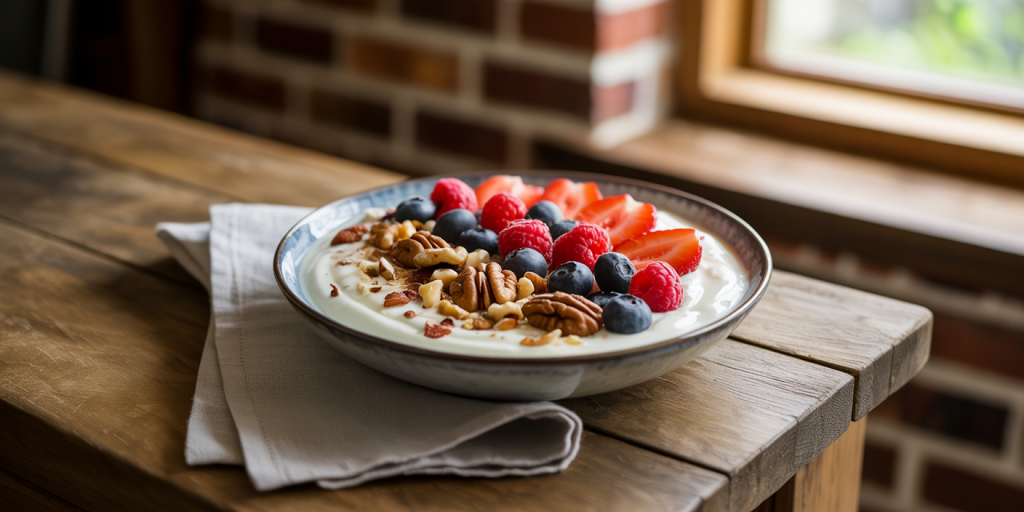Starting the day with a nutrient-dense breakfast is essential for maintaining energy levels, enhancing focus, and managing hunger. Protein, in particular, plays a critical role in satiety, helping individuals avoid mid-morning cravings and overeating later in the day. Studies show that breakfasts high in protein increase feelings of fullness and reduce overall calorie intake, making them an effective tool for weight management and metabolic health (Leidy et al., 2015). This article explores ten high-protein breakfast options that not only keep you full until lunch but also support overall well-being.
Why Protein in Breakfast Matters
Protein’s role in appetite regulation comes from its influence on key hormones like ghrelin, which stimulates hunger, and peptide YY, which promotes satiety. Research highlights that consuming at least 20-30 grams of protein at breakfast can sustain fullness longer compared to carbohydrate- or fat-heavy meals (Jakubowicz et al., 2013). For instance, a study conducted at the University of Missouri found participants who ate a high-protein breakfast consumed fewer calories later in the day, suggesting better appetite control.
Moreover, protein helps maintain lean muscle mass, vital for metabolism, especially during weight loss or aging. Breakfasts rich in protein contribute to muscle protein synthesis and metabolic rate enhancement, beneficial for individuals engaged in physical training or senior adults combating sarcopenia.
1. Greek Yogurt with Nuts and Berries
Greek yogurt is a powerhouse of protein, with one cup typically containing 15-20 grams of protein. Its creamy texture combined with crunchy nuts and fresh berries creates a satisfying and nutrient-packed meal. Almonds, walnuts, or pistachios add healthy fats and extra protein, enhancing satiety further.
A practical example involves swapping a typical sugary cereal breakfast for Greek yogurt with ¼ cup of mixed nuts and a handful of blueberries. This combination provides approximately 25-30 grams of protein and beneficial antioxidants from berries, supporting cognitive function and reducing inflammation. According to the USDA Nutrient Database, adding 30 grams of almonds (about 6 grams protein) and ½ cup Greek yogurt (around 10 grams protein) significantly increases the meal’s protein content.

2. Eggs and Avocado Toast
Eggs remain one of the most accessible and effective protein sources. With about 6 grams of protein per egg, a two-egg breakfast reliably hits the threshold for satiety-promoting protein intake. Combining eggs with avocado toast enhances the meal’s nutrient density by adding fiber, heart-healthy fats, and vitamins like E and K.

Eggs can be prepared in various ways to maintain novelty — boiled, poached, scrambled, or as an omelet with vegetables such as spinach or tomatoes for added micronutrients. In clinical trials, participants consuming protein-rich breakfasts with eggs reported less hunger and fewer calories consumed at subsequent meals (Vander Wal et al., 2005).
3. Cottage Cheese Bowl with Fruit and Seeds
Cottage cheese is an underrated but excellent high-protein option, containing roughly 14 grams of protein per half-cup serving. It is also low in fat and carbohydrates, making it ideal for those monitoring their macronutrient intake.
Topping cottage cheese with fresh fruits such as pineapple, peaches, or strawberries introduces natural sweetness and fiber, while seeds like chia or flax add omega-3 fatty acids and further protein. One cup of low-fat cottage cheese paired with a tablespoon of chia seeds results in over 25 grams of protein. This meal is particularly popular among athletes and fitness enthusiasts for muscle recovery and energy sustenance throughout the day.
4. Protein Smoothies with Plant-Based Powders
Protein shakes or smoothies offer quick, adaptable breakfast solutions. Using plant-based protein powders such as pea, rice, or hemp protein addresses dietary restrictions like vegetarianism or lactose intolerance. A smoothie made with a scoop of protein powder, spinach, banana, and unsweetened almond milk can provide 20-30 grams of protein.

An added advantage of smoothies is the ability to customize macronutrient profiles. For example, including nut butters introduces healthy fats and increases calorie density, making the drink not only satisfying but also an ideal meal replacement for busy mornings. Market trends indicate a growing demand for plant-based protein, with the global market expected to reach $14 billion by 2025 (Grand View Research, 2021).
5. Quinoa Porridge with Nuts and Protein Boosters
Quinoa is a complete plant protein containing all nine essential amino acids, delivering about 8 grams of protein per cooked cup. Preparing quinoa as a porridge and adding nuts like almonds or walnuts can elevate the protein content even more.
For example, a serving of quinoa porridge with a tablespoon of almond butter and a sprinkle of hemp seeds can provide roughly 20-25 grams of quality protein. Quinoa’s high fiber content slows digestion, promoting longer-lasting fullness. This breakfast option caters well to gluten-free individuals and those seeking alternative grains to diversify their diets.
| Breakfast Type | Protein per Serving (grams) | Calories | Satiety Rating* |
|---|---|---|---|
| Greek Yogurt + Nuts | 25-30 | 250-350 | High |
| Eggs + Avocado Toast | 20-25 | 300-400 | High |
| Cottage Cheese + Seeds | 20-25 | 200-300 | Moderate-High |
| Protein Smoothie | 20-30 | 250-400 | High |
| Quinoa Porridge | 20-25 | 300-350 | Moderate-High |
*Satiety rating based on subjective hunger scales measured 3 hours post-breakfast in clinical observations.
6. Smoked Salmon and Whole Grain Bagel
Smoked salmon is a gourmet yet practical source of lean protein, with approximately 18 grams of protein per three ounces. Paired with a whole-grain bagel, this breakfast combines protein with complex carbohydrates to provide sustained energy release.
Omega-3 fatty acids in salmon contribute to heart health and inflammation reduction, while the bagel’s fiber content helps control blood sugar spikes. This breakfast is favorite among professionals who value time-efficient meals that don’t sacrifice nutrition — smoked salmon is often ready to eat, requiring minimal preparation.
7. Tofu Scramble with Vegetables
For vegan or plant-based eaters, tofu scramble offers an excellent alternative to traditional egg breakfasts. Firm tofu provides about 10-15 grams of protein per half cup, and when sautéed with nutrient-dense vegetables such as bell peppers, mushrooms, and kale, it becomes a filling, flavorful meal.
In addition to protein, tofu supplies isoflavones, compounds linked to benefits in cardiovascular health and bone density. Tofu scrambles have proven to be satisfying due to their high water and fiber content from added vegetables — components that slow digestion and prolong satiety.
8. Peanut Butter and Banana on Whole Wheat Bread
This classic and easy-to-make breakfast delivers protein and healthy fats primarily from peanut butter, which contains about 8 grams of protein per two tablespoons. Paired with a banana and whole wheat bread, it offers carbohydrates, potassium, and fiber to enhance fullness and energy.
In real-world studies, participants consuming nut butters experienced prolonged satiety due to the blend of protein, fats, and fiber. This option is ideal for those who prefer quick breakfasts and need sustained energy for morning workouts or work sessions.
9. Chia Seed Pudding with Protein Milk
Chia seeds can absorb up to 10 times their weight in liquid, forming a pudding-like texture that is high in fiber, omega-3 fatty acids, and moderate protein (about 5 grams per 2 tablespoons). When made with protein-fortified milk — such as cow’s milk or fortified plant milk varieties — the protein content increases substantially.
An example is combining 3 tablespoons of chia seeds with one cup of protein-fortified almond milk and a drizzle of honey, which can result in 20 grams or more of total protein. This combination supports digestion and provides a cooling, refreshing breakfast during warmer months.
10. Turkey Bacon and Egg White Wrap
Lean turkey bacon offers a lower-fat alternative to traditional pork bacon, with about 5 grams of protein per two slices. When wrapped with egg whites (each containing roughly 3.6 grams protein) in a whole grain or low-carb wrap, it forms a compact, portable breakfast with upwards of 25 grams of protein.
This meal is frequently chosen by fitness enthusiasts and busy professionals who prioritize protein intake without excess saturated fat. Its portability also suits on-the-go lifestyles, offering the flexibility to eat during commutes or short breaks while maintaining nutritional goals.
Looking Ahead: The Future of Protein-Rich Breakfasts
Trends indicate a rising global demand for high-protein foods, driven by increasing awareness of protein’s role in weight management, muscle health, and chronic disease prevention. Innovation in breakfast options continues, with companies launching novel protein-enriched products such as plant-based meat alternatives, insect protein snacks, and fortified cereals.
Personalized nutrition is also transforming breakfast patterns. Advances in nutrigenomics allow customized meal plans based on genetic profiles, optimizing protein intake to each individual’s metabolism and health status. Wearable technology and app-based tracking further facilitate maintaining ideal protein consumption throughout the day.
Furthermore, sustainability considerations push the development of ethical protein sources. Plant-based proteins and cultured meat products may soon dominate the breakfast table as alternatives to animal proteins, balancing health with environmental impacts.
As breakfast habits evolve, prioritizing high-protein meals will remain essential for promoting fullness, enhancing cognitive function, and supporting long-term health outcomes.

Deixe um comentário